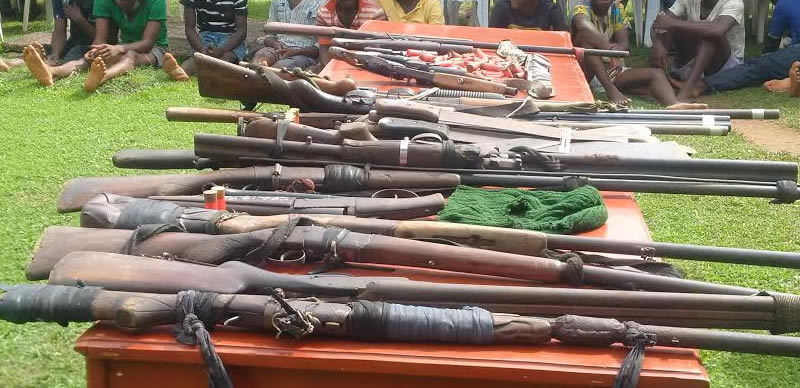The proliferation of small arms and light weapons (SALW) poses a significant threat to global peace and security, fueling conflicts, escalating violence, and undermining development efforts. Nigeria, grappling with various security challenges including terrorism, banditry, and communal clashes, recognizes the urgent need to control the spread of these weapons within its borders. As part of a concerted national effort, the National Centre for the Control of Small Arms and Light Weapons (NCCSALW) has undertaken a sustained campaign to remove illicit and obsolete firearms from circulation. A recent public demonstration of this commitment involved the destruction of over 1,300 assorted weapons, adding to the more than 13,230 firearms eliminated since 2021. This decisive action underscores Nigeria’s dedication to curbing the proliferation of SALW and fostering a more secure environment for its citizens.
The destruction of these weapons, overseen by retired Deputy Inspector-General of Police Johnson Kokumo, the Director-General of NCCSALW, represents more than a symbolic act. It serves as a tangible demonstration of transparency and accountability in the management of seized and obsolete firearms. By publicly destroying these weapons, NCCSALW ensures that they cannot re-enter circulation and fall into the wrong hands, thus preventing their potential misuse in criminal activities or fueling further conflict. This commitment to transparency reinforces public trust in the government’s efforts to address the issue of illicit arms and promotes confidence in the security agencies responsible for collecting and managing these weapons.
The sources of these destroyed weapons are diverse, reflecting the multifaceted nature of the arms proliferation challenge in Nigeria. Some were seized during counter-terrorism and anti-banditry operations, highlighting the ongoing struggle against armed groups in various parts of the country. Others were obsolete firearms from the armed forces, demonstrating the importance of responsible disposal of outdated weaponry to prevent its diversion to the illicit market. Additionally, some weapons were surrendered by law enforcement agencies, showcasing the internal efforts to ensure proper management and control of firearms within the security sector. This comprehensive approach underscores the commitment to tackling the problem from multiple angles, addressing both internal and external sources of illicit weapons.
The destruction exercise aligns with Nigeria’s international obligations under various treaties and conventions aimed at controlling the spread of SALW. These include the ECOWAS Convention on Small Arms and Light Weapons, Their Ammunition and Other Related Materials, and the United Nations Programme of Action to Prevent, Combat and Eradicate the Illicit Trade in Small Arms and Light Weapons in All Its Aspects (UNPoA). By adhering to these international agreements, Nigeria demonstrates its commitment to global efforts to combat the illicit arms trade and contributes to regional and international security. This collaboration is crucial in addressing a transnational challenge that requires coordinated action across borders.
Recognizing that arms proliferation is not confined within national boundaries, NCCSALW has actively pursued collaborations with neighboring countries, particularly Chad and Cameroon, to address cross-border arms trafficking. These partnerships involve sharing information, coordinating operations, and strengthening border security measures to stem the flow of illicit weapons into and out of Nigeria. These joint efforts acknowledge the interconnected nature of the challenge and the need for regional cooperation to effectively combat the movement of illegal firearms. Such collaborations are essential for creating a more secure environment across the region.
The ongoing efforts of NCCSALW represent a crucial component of Nigeria’s broader security strategy. By consistently removing illicit and obsolete firearms from circulation, the center contributes to reducing the availability of weapons that fuel violence and instability. The public destruction of these weapons serves not only as a practical measure to prevent their misuse but also as a powerful symbol of the government’s commitment to tackling the complex challenge of arms proliferation. This commitment is essential for creating a safer and more secure Nigeria for all its citizens and contributing to regional stability. NCCSALW’s sustained efforts are critical in paving the way for a peaceful and prosperous future for Nigeria and the wider region.


